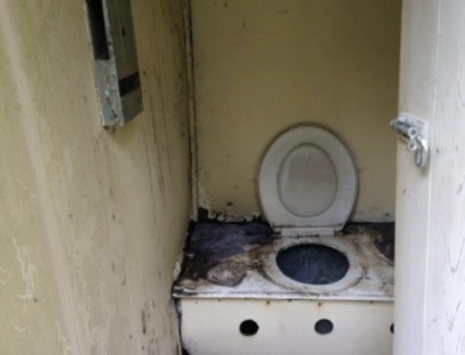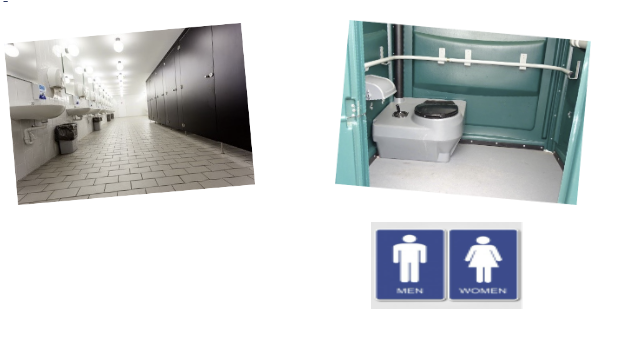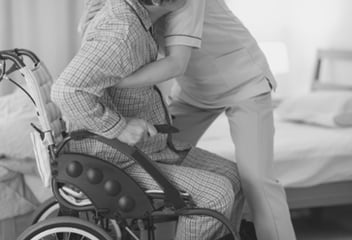Fixing the toilets in your workplace
Toilets at work can often be a vexed issue – after all who hasn’t seen some disgusting things out there. But when your female there are additional considerations – like access to a female toilet that’s not a mile away, and hygienic sanitary bins. And it just seems to get worse when you work remotely, mobile or in construction. Take a look at the photo from an article “Women Tradies say their amenities are an after-thought in a male dominated industry”, published in August 2021 as just an example.

It is clear that the current amenities and toilet provisions in the WHS ‘Managing the Work Environment and Facilities’ Code of Practice are either not being enforced nor are they adequate for all workplaces, particularly as more women are now working in once male dominated industries such as construction, mining, manufacturing and energy.
Under the Code, separate toilet for male and female workers should be provided except where there are fewer than ten workers or there are two or fewer workers of one gender. Toilets should be provided with toilet paper, hand washing facilities, rubbish bins, and hygienic means to dispose of sanitary products. Toilets must also be accessible for all workers, including for workers with a disability, and should be preferably located inside a building or as close as possible to the workplace.
For work undertaken away from base locations or at outdoor sites, workers must have access to other toilets. For example, public toilets or toilets located at a client’s premises. Portable toilets should also be provided at short term temporary workplaces and workplaces in remote areas in a secure place with safe access.
In practice, male toilets are generally provided at fixed workplaces, but females toilets are often overlooked. Where they are provided, they are of a very poor standard (as in the picture above), are located away from the immediate work area, and do not include essential items such as sanitary bins.
Where toilets are not provided in accordance with the Code, this is a non-compliance which needs to be rectified. A Health and Safety Rep can issue a Provisional Improvement Notice (a PIN) and also ask their union or the inspectorate to attend the worksite to help resolve the matter.
This is because it is a duty of a person conducting a business or undertaking (a PCBU) to ensure, so far as is reasonably practicable, the provision of adequate facilities for the welfare at work of workers in carrying out work for the business or undertaking, including ensuring access to those facilities.
The WHS Regulation also provides that the PCBU must ensure, so far as is reasonably practicable, the provision of adequate facilities for workers, including toilets, drinking water, washing, and eating facilities, and that these facilities must be in good working order, clean, safe, and accessible.
Not providing toilets or providing less favourable conditions for workers based on their sex or gender is also a discrimination matter. In some workplaces, it can also be a serious psychosocial hazard if it is causing stress for female workers.
So how do we fix this?
The best way to fix something is to talk about it and make everyone aware this is happening and is not acceptable.
Clean, safe and equal access to toilets at work is an issue for all workers – men and women. As Health and Safety Reps, you have the power to start the discussion and to help fix it at your workplace.
Do yourself a favour and ask around at your workplace if this is an issue – but make sure you ask both men and women, and for women in your work group where are the toilets located, are they safe and clean, and do they have access to sanitary bins.

Summary of WHS Laws
The following extracts from the WHS Act, WHS Regulation and Codes of Practice clearly outlines workers’ rights to amenities and toilets and the PCBUs responsibilities to ensure it happens.
Primary Duty of Care, section 19 (e) of the Work Health and Safety Act 2011;
The PCBU is responsible to ensure -
The provision for adequate facilities for the welfare at work of workers in carrying out work for the business or undertaking, including ensuring access to those facilities.
This means the employer (PCBU) must provide suitable facilities for all workers at a workplace/site regardless of the workers’ gender.
WHS Regulation s 41 – Duty to provide and maintain adequate and accessible facilities
The PCBU must ensure, so far as is reasonably practicable, the provision of adequate facilities for workers, including toilets, drinking water, washing, and eating facilities. These facilities must be in good working order, clean, safe, and accessible.
Code of Practice 2011 Managing the Work Environment and Facilities
s 1.3 Monitoring and maintaining the work environment and facilities
- PCBUs must monitor the conditions of the work environment, including facilities, to ensure the health and safety of workers.
- The work environment must be maintained so that it remains in a clean and safe condition. Facilities must be clean, safe, accessible and in good working order.
- Workplaces and facilities should be cleaned regularly taking into account the type of work performed, any contamination, the number of workers, the type of facility, such as dining areas, toilets, handbasins, and showers.
s 3.1 Access to facilities
Workers, including those who have particular needs or disabilities, must have access to the facilities.
This would mean that:
- Workers are provided with breaks to use facilities
- The facilities are within a reasonable distance from the work area
- Workers on different shifts have similar access
- The means of access is safe at all times
s 3.3 Toilets –
Access to clean toilets must be provided for all workers (regardless of gender) while they are at work. Where practicable, toilet facilities should be provided for workers, rather than relying on access to external public toilets.
Subheadings – Number of toilets
For workplaces within buildings, the National Construction Code (NCC) sets out the ratio of toilets to the number of workers, and the specifications for toilets. Generally, separate toilets should be provided in workplaces where there are both male and female workers. Unisex toilets may be provided if the number of workers is 10 or fewer or there are two or fewer workers of one gender.
For all other workplaces separate toilets should be provided.
Design of toiletsToilets should be fitted with a lid, have lighting and ventilation, signed appropriately, fitted with a lockable door, and positioned for privacy separate from other rooms.
Access to toilets
Toilets must be accessible for all workers including workers with a disability. Preferable toilets should be located inside a building or as close as possible to the workplace.
Work undertaken away from a base location such as gardeners, bus drivers, couriers, must have access to other toilets, and in such cases should be provided to workers on where the toilets are located.
Where work is conducted remotely or where it is not practicable to provide access to permanent toilets, for example on a Construction site, then Portable toilets should be provided. These toilets should be serviced regularly to keep them clean.
s 3.4 Hand washing
Hand washing facilities should –
- accessible at all times of work
- be separate from troughs or sinks used in connection with the work
- contain both hot and cold water
- protected from the weather
- be supplied with soap
- contain hygienic hand drying facilities
For more detailed information on women’s rights to have access to appropriate amenities refer to WHS Act 2011, WHS Regulation 2011 and Code of Practice 2021 Managing the work environment and facilities.

